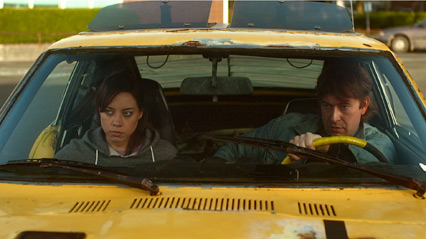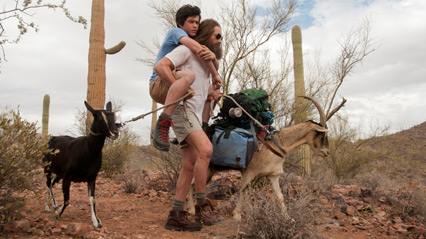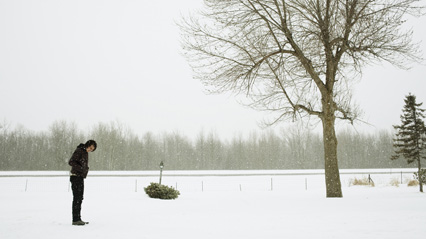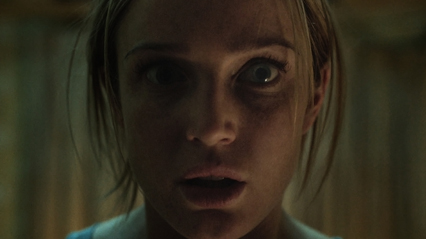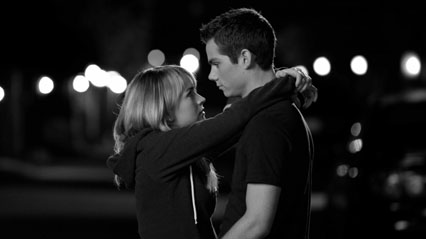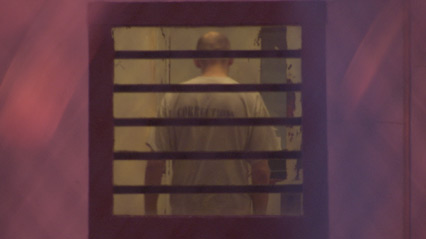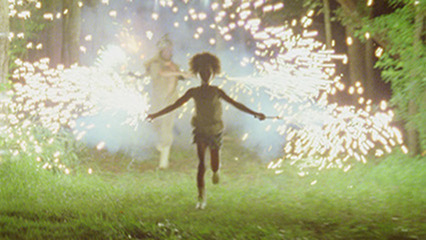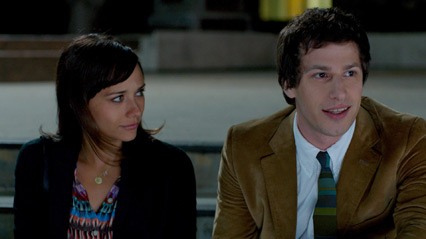Film Essent Archive for January, 2012
Sundance Docs Roundup: Detropia, Queen of Versailles, and Ethel
Detropia
Sundance vets Rachel Grady and Heidi Ewing were back this year with Detropia, a look at a city that’s gone from being the fastest growing city in the US to one of the most rapidly declining. Detropia has a palpable opinion about its subject matter (Ewing grew up just outside Detroit), and the filmmaker’s views on the deterioration of Detroit and the reasons it’s happening are made pretty clear. They’re not offering up ideas on how to fix Detroit, they’re holding up this visually compelling, artfully constructed, beautifully shot film about a city falling apart before the lens of their camera. And somehow amidst the ruin, the despair, and the wrecking balls, the residents sticking it out still have spirit and a determination to bring Detroit back from the brink of disaster.
Working from a thesis of “as Detroit goes, so goes the nation,” Grady and Ewing forego their typically structured style for a more free-flowing approach, where painterly visuals are used to tell the story, the people interviewed acting as an enraged Greek chorus commenting on what we’re seeing rather than an collection of individual voices meekly complaining. Grady and Ewing use Detroit as a microcosm case study of what happens to a city when a declining economy, corporate greed and job outsourcing strip away the livelihoods of tens of thousands of workers, effectively cutting the beating heart out of a once-thriving city.
One of the people interviewed by the filmmakers refers to Detroit as the proverbial canary in a coal mine, and it’s clear the filmmakers are sending an urgent message here: Look at what’s happened to this once great city. This could be your city, your hometown next, because the problems that plague Detroit are hardly endemic to this one place. Even as they paint a bleak picture of a city on the verge of complete flatline, though, Grady and Ewing keep a finger on the pulse that’s still keeping the city together: the resilient residents, pissed off at the auto companies for taking away the jobs that built their city to begin with, but determined not to give in; the politicians desperately struggling to figure it all out before the state steps in and takes over completely; and the artists inspired to capture this moment in history on canvases, through songs, through written and spoken word.
Queen of Versailles
One of the surprises of this year’s Sundance was Queen of Versailles, Lauren Greenfield’s “rags to riches to rags” documentary about David and Jackie Siegel, who had more money than they knew what to do with, and all the power and freedom that goes along with that – until the 2008 economic downturn delivered a reality smackdown that neither of them was prepared for.
The vividly symbolic representation of the Siegel’s spectacular success and failure is Versailles, the 90,000 square foot house the couple were building in Florida (their current house, at only 27,000 or so square feet, being a little too small for their abundant possessions). Versailles was only halfway built when the economic bubble burst, causing David Siegel’s wildly successful condo timeshare business to deflate, threatening the company’s new showcase towers in Las Vegas and forcing thousands of layoffs within the company. Although the land and house were paid for, Siegel took out a mortgage against the property to keep his business going, and with his hard-fought business collapsing around him like a flimsy house of cards, Siegel takes to retreating more and more to solitude in his room, where he surrounds himself, monk-like, with stacks and stacks of business papers, desperately struggling to keep everything afloat.
Jackie, meanwhile, still has eight kids to raise – a perfectly reasonable number of kids when your husband is super-rich and you can afford a pack of nannies and a household staff of 19 to keep everything clean and functioning, but a little overwhelming when you don’t have the support to which you were accustomed. With their belts tightened, though, the Siegels have to face the reality of needing to make some serious cutbacks, reducing the household staff down to just a couple of nannies, switching their kids from private to public schools, selling off the private jets and whatever other big-ticket items they can.
A blond beauty queen smart enough to graduate from RIT before she met and married David Siegel, Jackie remains the primary focus throughout the film – a great call on Greenfield’s part, because while in the first half of the film you can’t help but just roll your eyes at the family’s extravagant lifestyle, by the second half Jackie, desperately trying to hold things together for her family, painting a strained smile on her face as she tries to offer support and love to a husband too far lost in depression and gloom to do more than half-heartedly swat her and their children away, becomes a much more sympathetic character.
David Siegel is cocky and arrogant at the beginning of the film, but even then we see a glimpse of his insecurities when he wonders aloud what his much younger, beauty queen wife sees in him. We see Jackie’s insecurities, too, as she nervously half-jokes that David had told her that once she turned 40, he was going to replace her with two 20-year-olds (ah, rich old white guy humor, heh heh, what a kidder). And we see both of their insecurities refracted hugely through their hoarding of wealth and possessions; it’s not just the 90,000 square foot house, it’s the eight kids, and the however-many dogs, and a Christmas shopping trip to Wal-Mart (multiple carts worth) in which Jackie throws random toys in the cart, barely looking at them.
The childrens’ Filipino nanny is used to great effect as a part of Greenfield’s storytelling, as we learn that she left behind her own children back in her home country to come to the US to work as a nanny to support them. She sends her family all that she makes, but hasn’t seen her own kids in many years; instead, her young charges have become the surrogates upon whom she’s lavished her love. And there’s a poignant scene where she shows the little house in which she lives – a small playhouse that belonged to the twins that they no longer use, that speaks volumes about status and class in the era of the 99% versus the 1%.
Ethel
Ethel, Rory Kennedy’s documentary homage to her mother, Ethel Kennedy (widow of Robert F. Kennedy) is a warm, lovely portrait of a woman who’s passion for life and philosophic value system supported her husband in his political aspirations, and the 11 children she was left to raise when he was killed. The undeniable poignancy of the film is derived, in large part, by Rory Kennedy’s search to understand her father, a legend and political hero who was killed six months before she was born. As the only one of her large pack of siblings not to have any memory at all of her father, one has to imagine that she grew up with this enormous hole in her life where her father should have been, and that a lifetime of being referred to as the daughter of RFK had its impact on her. But it’s Rory’s mother, Ethel, who’s the heartbeat and pulse of this story, as she was in the lives of Rory and her siblings, and structurally, she and her filmmaking team do a fantastic job arcing the story of this fiercely loyal, independent, fun-spirited woman who we don’t know all that much about, against the familiar historical events surrounding Jack and Bobby Kennedy.
There’s a particularly poignant moment in the film when Rory asks her mother about the day RFK died. Immediately, her face is etched with buried grief, her eyes fill with a well of deep, long-suffering sorrow, and she tells her daughter simply, I don’t want to talk about that. It says all we need to know. Her daughter focuses instead on the woman who refused to wallow in grief and despair when her husband died, his tragic death following that of his brother’s and Martin Luther King, Jr.’s such a pivotal point in our nation’s history, holding her head up and turning her focus to raising his children to be the kind of adults he would have been proud of.
This is an engaging, compelling film, filled with abundant never-before-seen home video footage of what Bobby and Ethel’s life was like, with their brood of happy kids tromping around their farm, their mother forever thinking of interesting and daring things for them to do, and their staunch Catholic insistence that their children not only appreciate all the privilege that comes with being born a Kennedy, but that they learn about the problems in the world and put their minds and their social and political power to use in finding ways to be a part of the solution.
Sundance Review: Safety Not Guaranteed
One of the biggest surprises of this year’s Sundance is just how terrific Safety Not Guaranteed, Colin Trevorrow’s film based on a real Craigslist ad seeking a companion for time travel, turned out to be. The film’s quirky premise, which sends three magazine employees to investigate whether the man who placed the ad really thinks he can travel through time, seems funny enough just based on the premise (and it is), but like the writers who go off in search of what they think will be a wacky story to poke fun at, we find instead a very human film that’s complicated and genuine and never cruel in its use of humor. I thought this was by far the strongest script at this year’s Sundance in terms of sheer quality of writing and execution of idea, and apparently I wasn’t the only one; screenwriter Derek Connolly won the Waldo Salt Screenwriting Award for Safety Not Guaranteed at last night’s awards ceremony.
Read the full article »
Sundance Review: Goats
There’s a good deal to like in Goats, a coming-of-age tale adapted by Mark Jude Poirier off his own 2001, semi-autobiographical novel, and helmed by first-time feature director Christopher Neil (nephew of Francis Ford Coppola, cousin of Sophia Coppola). The film focuses on Ellis Whitman (Graham Phillips), a 14-year-old kid, wise and responsible beyond his years, who lives with Wendy (Vera Farmiga) his child-like, trust-fund mom in a posh, comfortable home in Tucson. Ellis’s dad, who his mom calls “Fucker Frank,” is long-gone and barely a presence in Ellis’s life; filling the gap left by his absence is Goat Man (David Duchovny, very funny here and almost unrecognizable in a desert-prophet full beard and long, wind-blown hair), a friend of his mom’s who’s lived in the pool house rent-free for as long as anyone can remember, taking care of her property, cleaning the pool, and raising goats and a spectacular greenhouse crop of pot.
Read the full article »
Sundance Review: For Ellen
So Yong Kim (In Between Days, Treeless Mountain) is back at Sundance this year with For Ellen, a quiet, meticulously paced character study about Joby (Paul Dano), a would-be rock star , who takes a road trip back to the small midwest town where his soon-to-be ex and young daughter live so that he can sign divorce papers. Joby needs the financial settlement the divorce will give him in order to finish his latest album — which he sees as his last chance to make it or break it. Upon his arrival, though, he learns that his inept attorney (Jon Heder) has negotiated a settlement that will require him to give up all rights to the daughter he hasn’t seen since she was a baby. Faced with this choice, Joby’s suddenly he’s not so sure what he wants.
Read the full article »
Sundance Review: Compliance
Craig Zobel, who was last at Sundance in 2007 with Great World of Sound, a sharply directed and acted film about a record producing company scam, is back at Sundance this year with a film about a different sort of scam, Compliance, an equally sharp examination of what happens when Sandra, a fast food restaurant manager, receives a phone call from a police officer informing her that one of her young employees, Becky, has been accused of stealing from a customer’s purse and must be detained.
It’s a stressful day for Sandra, one that started with the discovery of a freezer left open and over a thousand dollars of food lost, and the looming possibility of a “secret shopper” quality control visitor, and perhaps that strain contributes to all that unfolds over the next 80 or so minutes of utterly riveting screen time as Sandra complies with the increasingly bizarre requests made by the the caller. And what happens in the course of this story would be unbelievable – if it wasn’t all based on a true case of a McDonald’s manager and employee in Kentucky.
Read the full article »
Oscar Noms Are Out. Now, Back to Sundance.
Happy Oscar Nomination Day from Sundance! A few quick thoughts on the Oscar noms …
The Good
Melissa McCarthy pulls off the Supporting Actress nomination! Fabulous.
Ditto Janet McTeer (Supporting Actress) and Glenn Close (Actress) for Albert Brooks
And awesome for Rooney Mara getting the Best Actress nomination, too.
Undefeated gets a nod for Documentary, huzzah! Co-director TJ Martin is one of the nicest, most genuine people you’ll ever meet.
And also happy to see Hell and Back Again in the running for documentary.
The Bad
No Tilda Swinton for We Need to Talk About Kevin. Sorry, but I’d rather have had her in there than Meryl Streep. Love Streep, but Iron Lady is … well, it is what it is.
No David Fincher for Dragon Tattoo? Sigh.
Trent Reznor and Atticus Ross not getting nominated for Original Score, also a disappointment.
No Best Supporting Actor nom for Albert Brooks (WTF, Academy?)
Young Adult being completely shunned, especially Charlize Theron for Best Actress, Patton Oswalt for Best Supporting Actor, and Diablo Cody for Original Screenplay.
The Descendants getting nominated for Adapted Screenplay. And Best Picture, for that matter. Lazy screenplay, mediocre film.
And no Buck for Documentary? Boo.
Sundance Review: The Pact
The Pact, directed by Nicholas McCarthy, played here at Sundance as a short film last year, and came back this year as a full-blown feature. Now I’m not much of a horror chick, though I do occasionally enjoy a good scare. For me (and, I’d have to say, a sizable percentage of the public screening midnight crowd with whom I saw it), The Pact delivers plenty of chills, jumps and squeal-worthy moments.
Read the full article »
Sundance Review: The First Time
The First Time , in spite of its title, isn’t at all the kind of raunchy teen sex comedy about a guy desperately trying to lose his virginity, and his friends trying to help him get laid that you might expect it to be. It’s a sweet, funny story about these two young people, Dave (Dylan O’Brien), who pines away for a girl who sees him only as a friend, and Aubrey (Britt Robertson), who’s already cynical about love by her junior year, who find each other unexpectedly. Things very quickly get way more complex than either of them imagined.
Of course, it’s no-brainer that you’d want to push this film hard at the teen market – the girls who will sweet talk their boyfriends into seeing a romantic teen flick, and the boys who see the title and think they might be able to segue straight from a film about teens having sex into a little role-playing of their own. Not to mention the girls who will see it over and over with packs of their girlfriends, so they can sit down afterwards and talk about how great Dave is, and how it would be so awesome if they could just meet a guy like that. And then they’ll go back to their lives, where they will continue to relegate the Daves of the high school world to the dreaded role of “friend” and hook up with the assholes.
However, The First Time also happens to be quite a good film that adults can relate to as well, because in spite of what my own teenagers sometimes think about my relative lameness, I was actually a teenager once myself, prone to all the angst and agony of those dicey first relationships when you’re still trying to figure out who you are and what you want and just how much of your sense of self worth is going to be built upon whether Mr. Washboard Abs wants to get in your pants. I’m not so far gone down the path of encroaching old age to not remember what it feels like to be anxiously trying to decide whether the potential – the cynic in me might say the inevitability – for a relationship to end up hurting one or both parties is worth however good it might make you feel for a while. And neither, probably, are you.
The First Time is relatable, also, to guys many years beyond that first flush of teenage hormones, especially the nice guys, the guys who forever find themselves relegated to the dreaded role of “friend.” Let me let you in on a little secret guys: You’re not always relegated to the “friend” position because we don’t find you sexually attractive; it’s often just that we women treasure our friendships with the opposite gender, and when you find a guy who’s nice, who listens, who cares what you think, who supports you and allows you to support him in return, do you really want to risk losing that by going down the path of “more?” to find that now you’ve blown it and have less? We just don’t want to risk it, which sucks for the nice guys who shake their heads in disbelief at our shockingly bad relationship choices, who’d love a chance to show us they would cherish us, treasure us, never treat us like crap. Why don’t we go for those guys more? It took me until I was in my 40s to really start to figure that out.
This is a charming, sweet film, but it gets surprisingly under your skin, especially in the last act. There are some places where it could be tightened up a notch or two (it currently runs 98 minutes, and I’d love to see a cut with about 10 minutes shaved off), but for the most part this is a very solid, very marketable film. The cinematography has lots of flow and movement (though an attempt at a Fincheresque camera move doesn’t quite work), the editing and story flow are good, and I have to say, the production design by Keith Cunningham (who previously was art director for Bridesmaids, Zodiac, Star Trek and The Social Network) is just terrific.
Sundance Review: The House I Live In
This film started out a little slow for me, and it also does two things I’m generally not fond of in documentary films: it uses a great deal of voiceover, and the director integrates himself heavily into the story. But wait, bear with me, because if you stick with this film, it pays off very well in spite of — perhaps even because of — those things. Jarecki’s a tremendously talented documentarian, and he deftly weaves together his family’s personal history and his own relationship with Nannie Jeter, the Black housekeeper/nanny who cared for him and his brothers when they were growing up, with his own growing understanding of the disparity between the paths he and his brothers took and the paths the members of Nanny’s family, with whom the Jarecki brothers grew up, into a greater tale about the War on Drugs and its disproportionate impact on African-American men.
Read the full article »
Sundance Review: Beasts of the Southern Wild
Beasts of the Southern Wild, directed by Behn Zeitlin and made by Court 13, the New Orleans-based filmmaking collective of which he’s a part, is a fabulous piece of cinematic storytelling. The story itself is fascinating, intricate, and completely unique: The protagonist is Hushpuppy, a six-year-old girl who lives a free and wild existence in The Bathtub, an isolated Bayou community physically and symbolically cut off from the rest of the world by the levee. Hushpuppy lives with her wild-man father and the pack of lovable, independent miscreants who’ve carved out their own way of life in this singularly unique place; school in The Bathtub is where the ragtag pack of kids who live there learn about survival and the value of independence.
Read the full article »
Sundance Review: Celeste and Jesse Forever
If you were hoping for Celeste and Jesse Forever, one of the most buzzed about titles going into Sundance this year, to be this year’s Like Crazy, you’re in luck. Beautifully written by Will McCormack and Rashida Jones (the writing debut for both actors), deftly directed by Lee Toland Krieger (The Vicious Kind), and effortlessly acted by Jones and Andy Samberg in the lead roles, Celeste and Jesse Forever is exactly the kind of gem you have to think buyers at Sundance will be salivating over. It’s charming, it’s touching, and it’s very accessible to a mainstream audience.
The film explores what happens when Celeste and Jesse (Jones and Samberg), who seem on the surface to be the perfect couple, decide to amicably divorce. All goes pretty well at first, so long as Jesse’s living in his artist’s studio behind the house and the pair are still hanging out every day. After all, they’re best friends, so why should they have to give that up just because they’re splitting up? Sure, their friends think it’s weird, but they’re doing them a favor, too, by not making them choose between them. What could possibly go wrong?
With a lesser script, this would play out in all kinds of lame cliches that would have had me inwardly groaning, but the arcs of both characters are so remarkably imagined and well-drawn that everything about Celeste and Jesse’s relationship felt very real – painfully real – to me. Having gone through a relatively amicable divorce and then the whole process of moving on into other relationships with my children’s father in the past couple years, there are certainly things about my personal life that I brought into watching this film play out. For me, the writing of the character of Celeste – this driven, in-control, strong woman who has to be “right” all the time, who fails to see and nurture the positive things about her relationship with Jesse until it’s too late to go back and fix what’s broken, was wrenching and real. I’ll say this: After the screening, there were lots of weepy-eyed, sniffly women in the rest room talking about how true this film felt to them.
I think of both Jones and Samberg more as comedic actors, and they certainly bring a level of playfulness to their respective roles that’s particularly effective in making the close friendship of these characters feel absolutely believable. But this script requires both actors to bring their dramatic chops as well, and they deliver on that front too. The supporting performances, particularly by Ari Graynor and Eric Christian Olsen as an engaged couple who are Celeste and Jesse’s best friends and McCormack as a likable pot dealer bemoaning the impact of medical marijuana on the economy of his drug dealing business, are also solid. Emma Roberts turns up as a flavor-of-the-month pop star who Celeste despises on principle but has to work with when her branding company takes her on as a client. There’s nothing at all wrong with Roberts’ performance here, and I’m delighted to see her in a project like this, but from a story standpoint this, for me, was a bit of a weak spot in terms of whether it really needed to be there. It’s a fairly harmless diversion, plot-wise, but it’s not what I’d consider an essential element of the storytelling. But that’s a small quibble for what’s overall quite an excellent film.
This is a very different kind of film than Krieger’s previous Sundance effort, The Vicious Kind (a film I still feel was vastly under-appreciated in its intelligence, depth and complexity). Nonetheless, you can see his particular style of storytelling in both films, in the way he has of getting his actors to dig under their skins and really find who these people are, and bringing them to life in a way that’s relatable. This is a superb job of direction. I do think there are a few places here and there where the film could still use a little tightening and tweaking (Krieger said in the intro that they just finished it a week-and-a-half ago), but there’s plenty of time to smooth out those few bumps before release if the film gets distribution – and I’d be surprised it if doesn’t. This one’s a winner.
1 Comment »Sundance Dispatch: From Snowpocalypse to Sundance
It was looking for a while there like I might end up missing a chunk of Sundance this year due to Snowpocalypse 2012 nailing Seattle. Usually when our weather men predict a Major! Winter! Storm! you can assume that in all likelihood, there might be a few wayward flakes, but a couple times a year we actually do tend to get a pretty good snow move in. Now I totally appreciate the stalwart nature of my East Coast friends, especially those in upstate New York, where we used to live, who scoff at what they see as Seattle’s overblown reaction to a little snow. I hear you. When we lived in Rochester, anything less than six inches of snow was a mere “dusting,” and it would take a serious blizzard to close schools.
But this is Seattle, which is built not just on one hill, but many hills. We have maybe two snow plows for the entire city, and one of those is some guy with a four-wheel drive pickup with a couple snow shovels duct-taped to the front. It’s dangerous to drive in Seattle when there’s snow, especially a lot of it, and even more dangerous when there’s ice. So when it looked likely that there actually might be a “snow event” moving in on Wednesday, I prudently decided to rebook my flight to Salt Lake City to Thursday, when the weather forecasters were predicting a warm-up to the low 40s and rain to melt all the snow away. Hah.
I woke up Thursday morning at 7AM to freezing rain. A lot of it. Buckets. Checked the weather report, it was supposed to be clear by noon. Noon came, and we were getting pelted so hard with a mix of freezing rain and snow I could barely see out my window. They changed the forecast — now it wasn’t going to clear until 3PM — right about when I needed to leave for the airport. Also, Sea-Tac was pretty much screwed, with the entire airport shut down for part of the morning until they could clear the ice that had fallen overnight from the runways. I anxiously tracked flights all morning: Delayed. Cancelled. Cancelled. Cancelled. Crap.
But, the one airline that seemed to be getting flights out was Southwest, which I happened to be traveling on. I had a gut feeling it might be okay, and that if we could just make it up the hill out of our neighborhood to the highway, it would probably be okay. My husband Mike volunteered to drive me, and so we left, just as the snow was really picking up. I just about had an anxiety attack on the hill. I was freaking out, telling Mike, forget it, forget it. Take me home, I’ll rebook my flight for whenever I can get on. We’re going to get killed. No, we aren’t, he calmly said. I got this.
And he did. We got up that hill, and the highway was (unsurprisingly) quite barren of traffic, save a few other idiots like us, mostly heading to the airport. The highway had been well-sanded, and the layer of snow coming down covered the layer of ice, and we made it, actually, in no more time than the trip normally takes in heavy Seattle traffic. I was prepared to sleep at the airport if my flight got cancelled, but miracle of miracles, it did not. We were delayed a bit to de-ice the plane, but we got in the air, landed with a bit of a bump 90 minutes later, and by midnight I was at our house in Park City. By 2AM I was settled in and watching a screener.
So far today, I picked up my press badge, put in ticket requests for public screenings, schlepped over to the Park City NPR affiliate to do a segment of The Daily Buzz with Film Society Lincoln Center’s Eugene Hernandez and Indiewire’s Dana Harris and Eric Kohn, schlepped back to the press office to pick tickets up, and caught three solid films so far: Elena, The Queen of Versailles, and Where Do We Go Now. Back at the MCN house for a quick bowl of soup and a sandwich and lovely cup of tea and then I’m heading off to Main Street to catch the midnight screening of The Pact.
I’ll be writing films up as I can in my downtime, but as at this past Toronto, I’m spending most of my energy these first few days of the fest into seeing as many films as I can, not into being the First! to write them up.
I Swear, I’ve Never Said Any of These Things
Well, except for the part about how Starbucks Via is not the same as real Starbucks. And the bit where I can drive in the snow just fine, it’s all the other dumbasses out there you have to watch out for.
Sundance Preview: Premieres

Ah, the premieres. The stars everyone wants to see, the glamor of the red carpets, and, for press, an opportunity to get an early look at some films that might be the next big thing for 2012. Everyone’s looking to see what pops at Sundance; by a couple days into the fest the buzz is in full swing in lines and on shuttles and over drinks at late-night parties. So, what did you think of this film? What’re you hearing about that one? Here are the Premieres about which I expect to hear a lot of buzz around and about Park City. (Note: All descriptions from the Sundance film guide.)
Read the full article »
Lines in the Sand
The standing ovation Newt Gingrich got from his white, Republican supporters in South Carolina for calling President Obama the “food stamp president” is just a stunning display of deliberate obtuseness in action. What exactly do these people think they’re applauding? The bit where Their Man Gingrich conveniently overlooks that the state of our economy, which President Obama inherited from Bush, Jr. — a state that was caused in large part by the corporate greed and lack of regulation that the Republican party heartily endorses — has screwed a lot of people over financially and directly contributed to the need for families to rely upon food stamps to, you know, eat?
Now, the “food stamp President” nonsense is an important issue, yes. But beyond that, there’s an overarching problem with the flood of barely concealed racism inherent in so many things that come out of this man’s mouth. The things like “poor kids lack a work ethic,” and his idea to get rid of adult janitors and pay poor students to clean their schools, and his saying things like how he doesn’t want to give Black people food stamps, he wants to give them work (conveniently ignoring the part where the majority of people on food stamps are not Black, but I guess he doesn’t want them to work). Al Sharpton made the point on Rachel Maddow tonight that if this was really about food stamps, Gingrich would have said “people on food stamps” not “Black people on food stamps.”
These issues go way beyond one standing ovation for Newt Gingrich. More and more, this presidential race is becoming about both the race divide and the class divide. And there’s a lot of overlap there, but we need some unity here. There is a clear line in the sand being drawn in what will ultimately be a showdown once we get through the primaries and find out who President Obama has to run against, and that line has to do with the very core beliefs we have as a people about not only what our country was founded on, but what we want it to be.





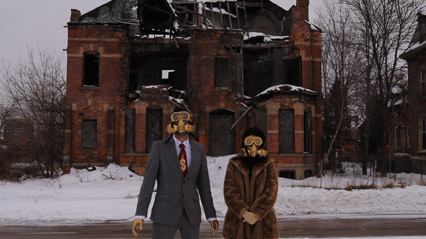
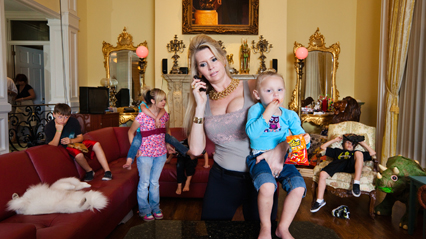
![Robert F. Kennedy [& Family];Joseph P. II Kennedy](http://moviecitynews.com/wp-content/uploads/2012/01/ethel2.jpg)
